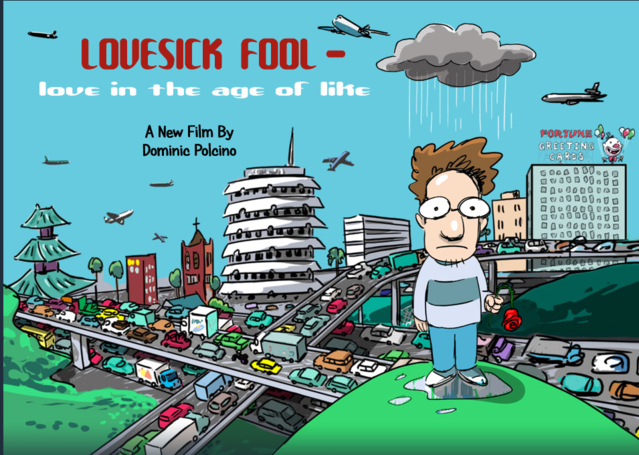Mating
"Lovesick Fool" Depicts Dating in the Post-#MeToo World
This film by Simpsons' director offers a humorous take on modern dating.
Posted February 8, 2018

The #MeToo movement shined a light on the alarming frequency with which women experience sexual harassment and assault. For women, this movement has led to a tsunami of emotions—from feelings of being supported and emboldened to anxiety and anger and PTSD. It started a world-wide conversation that has taken center stage—in the news, movie award ceremonies, one-on-one discussions—and it is a conversation that must continue.
A less talked about issue is how men are feeling in the wake of the #MeToo movement. This is understandably and justifiably so, since the #MeToo movement is primarily about making women’s voices heard after decades of being silenced and ignored. But just as women are feeling that their perspective and their experiences are finally being highlighted, many men are feeling like the rug has been pulled out from under them. Although this conversation isn’t as visible, it is certainly percolating in chat rooms and offices and lockers rooms around the world. Men who were raised to pursue women the way a hunter pursues prey are suddenly unsure of what constitutes appropriate dating behavior. The recent Aziz Ansari allegations (and the online debates that ensued) are a clear example of this.
So how is a good guy with an active sexual appetite supposed to navigate the modern dating scene? This is the overarching question that dominates the award-winning animated film Lovesick Fool. Told with wry, observational humor reminiscent of classic Woody Allen films, the movie follows the lead male character, Donnie, as he searches for love in the current world of Facebook likes and Tinder swipes.
Lovesick Fool is written and directed by Dominic Polcino, best known for his work on The Simpsons, King of the Hill, and The Family Guy. Audiences familiar with these shows will appreciate the awkward, flawed male character that leads the show (voiced by Dominic himself), as well as Donnie’s cast of quirky co-workers (Fred Willard, Janeane Garofalo) and his psychic/therapist (Lisa Kudrow). Check out the trailer here.
Although only forty minutes long, the film touches upon a number of psychological themes. First and foremost is the gender dynamic of men and women in modern society. The opening scene shows petroglyph sketches of cavemen hunting various beasts, then turning their clubs and sticks on women as a mating declaration. This, ostensibly, was the nature of dating in prehistoric times. Several instances of cavemen knocking women down and dragging them off are depicted until we get to a sketch of the lead of Lovesick Fool, Donnie. When he offers a playfully predatory growl to his potential mate, she turns around, clubs him on the head, and walks away. The message is clear: The rules for men have changed.
This idea that men’s traditional approach to pursuing a mate is akin to a hunter pursuing its prey is a theme revisited later in the movie. During this scene, Donnie’s more confident inner self tells him he can help Donnie pick up women based on “things he’s read and stuff.” Cut to Donnie standing outside a café. His confident self tells him, “What you need to do now is look at it like you’re the hunter and they’re the prey.” A woman walks by dressed in a zebra print dress and making neighing horsey sounds, another gracefully gallops by looking like a gazelle, and a third hops past like a bunny.
The imagery is amusing, but the underlying point is a serious one. From an early age, men are often told they should perceive themselves as the hunter and the woman they are pursuing as the prey. It is a message largely constructed by men for men, and at first glance it may seem harmless, but recent research shows it has very real-world consequences. In a series of experiments in my own research lab, I examined how this predator-prey message impacts men’s proclivity for sexual violence. Inspired by songs like Maroon 5’s Animals (“Baby I'm preying on you tonight; Hunt you down eat you alive”) and Duran Duran’s Hungry Like a Wolf (I'm on the hunt down I'm after you”) and the classic bar scene from the movie Swingers, my colleague and I had large groups of men and women read a passage that described a heterosexual man on a first date. Half of the participants read a neutral version but the other half read a version that included references to the men-as-predator and women-as-prey message. For example, instead of referring to a “night on the town”, the predator/prey version stated “a night on the prowl”. And rather than saying he “enjoyed the get-to-know-you phase” of dating, the predator/prey version stated he “enjoyed the chase.”
The alarming (but not necessarily unexpected) results indicated there was no significant difference for women who read the two types of readings. But the pattern for men was different. Men who read the predator/prey reading were significantly more likely than men who read the neutral version to indicate they would engage in rape if given the chance. Men who read the predator/prey reading were also higher in beliefs that perpetuate rape (e.g., women who are raped while drunk or sexily dressed asked for it; If a girl doesn’t fight back, it’s not rape).
The point is, just a few minutes of exposure to this predator-prey message was enough to encourage men to see themselves as sexual predators and women as their sexual prey. That is a concerning result, especially given the pervasiveness of this message in popular movies, songs, and even children’s cartoons (e.g., Tex Avery’s Red Hot Riding Hood; Zootopia).
Another psychological theme explored in Lovesick Fool is the impact of modern technology on human communication. In a world where emotional intimacy is more likely to be expressed with a texted emoji rather than a face-to-face exchange, one has to wonder if humans are losing their ability to connect with each other. In the film, this concern is expressed in a silent but poignant scene where Donnie is seated in a café and sees a young family at the nearby table. The husband kisses his wife, pays attention their baby girl for half a second, then pulls out his phone and starts texting. Soon the wife does the same. As sad classical music plays in the background, the audience is left to contemplate if technology is degrading our ability to engage in rich, deeply formed social bonds.
So what does the psychological research have to say about this theme? Here the news is mixed. On the one hand, online tools like texting and Facebook appear to facilitate, rather than impair, people’s social connections. For example, a longitudinal study by Kraut and colleagues found that the more hours people spent on the internet, the more time they spent having face-to-face contact with family and friends. This is because people often use the internet and email to maintain their connections with long distance relationship partners that they couldn’t physically socialize with.
On the other hand, as the scene in Lovesick Fool suggests, this same technology can negatively impact our face-to-face interactions when they do occur. In one study, researchers observed pairs of participants engaging in a 10-minute conversation in a coffee shop and noted whether either of the participants had a cellphone present during the interaction. Afterwards, the people who conversed in the presence of a mobile device felt less connected with their partner and less empathetic toward their partner than those without a mobile device. Keep in mind that in this study, the phone just had to be visually present to negatively affect the conversation. So even when our mobile devices aren’t buzzing and beeping, they can erode social connection. This is because they symbolize a wide network of people and information that draw our attention away from the conversation at hand.
Thus, the key is how we use our technology. Smartphones and the internet can be good socialization tools, so long as they enhance good old-fashioned physical interactions, rather than replace them or distract us from them.
In sum, Lovesick Fool is a quirky, humorous examination of dating in the modern age that also manages to touch upon serious psychological topics. It is also a movie clearly written with the male-perspective in mind. Every seemingly beautiful woman in it is leered at and ogled by the main character (although he rarely acts upon his urges). We get to see what that experience is like for Donnie, but have no sense of what that same experience is like for the opposite sex. In my opinion, that is the missing puzzle piece in this movie—especially in the wake of the #MeToo movement—and something that would make for a fascinating follow up to this film.
Most women are so used to being harassed and cat-called and treated as sexual objects that it is as much a part of their lives as sleeping and eating. Men may say they understand that fact on a logical level, but few have any idea what that experience is like day in and day out. As a social psychological researcher, I think what would balance out Lovesick Fool is the addition of a quirky, honest, humorous take on that uniquely-female experience. Now that’s a movie both men and women could relate to.
Lovesick Fool is available now on Amazon Prime and Vimeo.




